- Home
- About
- Advantages of JPods
- Capacity
- Conservation
- Economics
- 10X Capital Savings
- Base the $ on Energy
- Dangerous Economic Assumptions
- Free Markets
- Jobs
- Land Use
- Linear Barriers to Commerce and Nature
- Metrics: Replace GDP with Disposable Energy
- Parking
- Supply_Demand
- Free Market Efficiency
- Net Energy Decline
- Inaccurate IEA Forecasts
- 'Titanic' Oil Economy
- Paychecks and Oil
- History
- Lifeboat Paradox
- Links
- Management Team
- Metrics
- Payback
- Peak Oil
- Project Flow
- Recipe
- Solar
- Technologies
- What are JPods
- Why JPods®
- Be Involved
- Key Steps
- Franchise Agreement (draft)
- Solar Mobility Act
- Own and Operate a JPods Network
- Become a JPods Supplier
- Design Your Own JPods Network
- Investors
- Spread The Word
- 8-80 Cities
- Agreements
- Cities of the Sun
- Domestic War by 2023
- Kitty Hawk Network
- Regulation
- San Jose State
- Scale Model
- Railroad 1862
- News
- Cities
- Contacts
You are here
Georgia
Websites:
Traffic costs the people of Georgia about $25.2 billion each year. Thousands of jobs will be created to convert these costs into value and customer savings:
- $10.8 billion per year for foreign oil (link).
- $ 9.1 billion per year for accidents (link).
- $ 3.0 billion per year for congestion (link).
- $ 2.3 billion/year, car damage, bad roads (link).
Radically safer and more efficient transportation is very well understood:
- Freight railroads average 476 ton-miles per gallon (link).
- The Personal Rapid Transit (PRT or podcar) network in Morgantown has delivered 110 million oil-free, injury-free passenger-miles since being built as a solution to the 1973 Oil Embargo in 1975. In that same period of zero injuries, 1.7 million Americans died on the government highway monopoly. Highway accidents are not accidents. Who they happen to is random, that they happen is a design feature of the highway network.
In 1910 Thomas Edison noted it was practical to have all the electrical energy we need provided by sunshine:
"Sunshine is spread out thin and so is electricity. Perhaps they are the same, Sunshine is a form of energy, and the winds and the tides are manifestations of energy..... Do we use them? Oh, no! We burn up wood and coal, as renters burn up the front fence for fuel. We live like squatters, not as if we owned the property.... There must surely come a time when heat and power will be stored in unlimited quantities in every community, all gathered by natural forces. Electricity ought to be as cheap as oxygen...."
JPods Network for Atlanta's Hartsfield-Jackson Airport
Illustration of JPods stations at ATL Hartsfield-Jackson Airport. Stations are also in the adjacent parking lots.
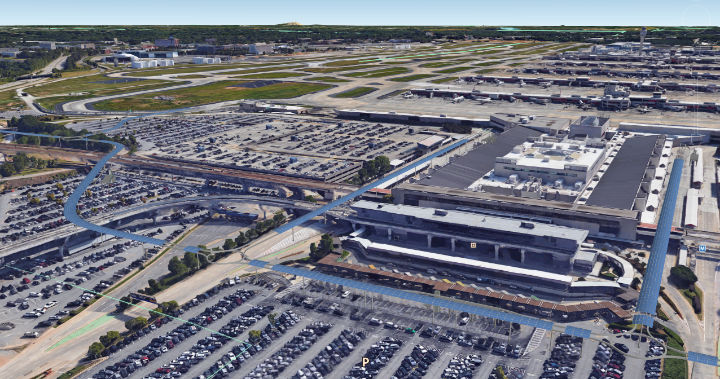
JPods stations at the Georgia International Convention Center, Mariott Gateway, Renaissance, and Spring Hill hotels.

Stations and JPods connections between parking areas, car rental, and the Convention Center (off screen upper right).
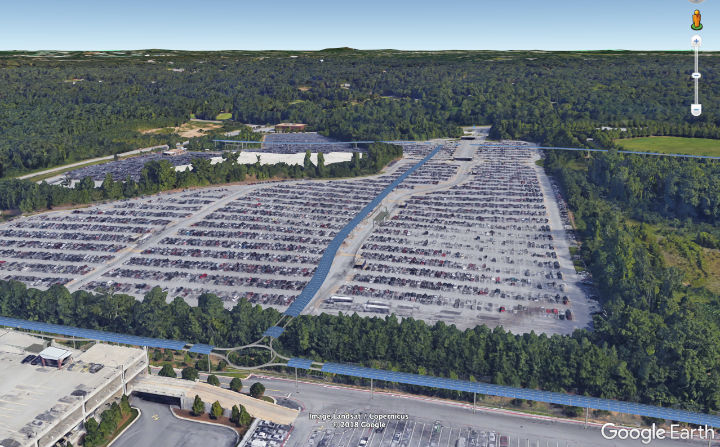
Map of the hotels connect by the network.

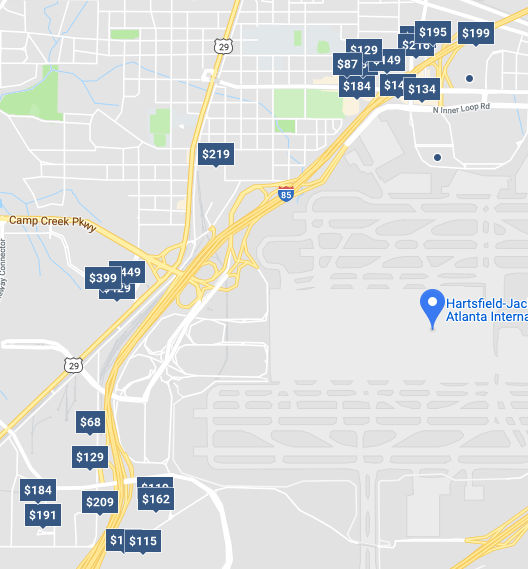
JPods3D model of the network.

Route-Time™ illustrates travel times.
From the Red Cross where you can walk, ride, walk is:
- Green is 5 minutes
- Blue is 10 minutes
- Yellow is 20 minutes
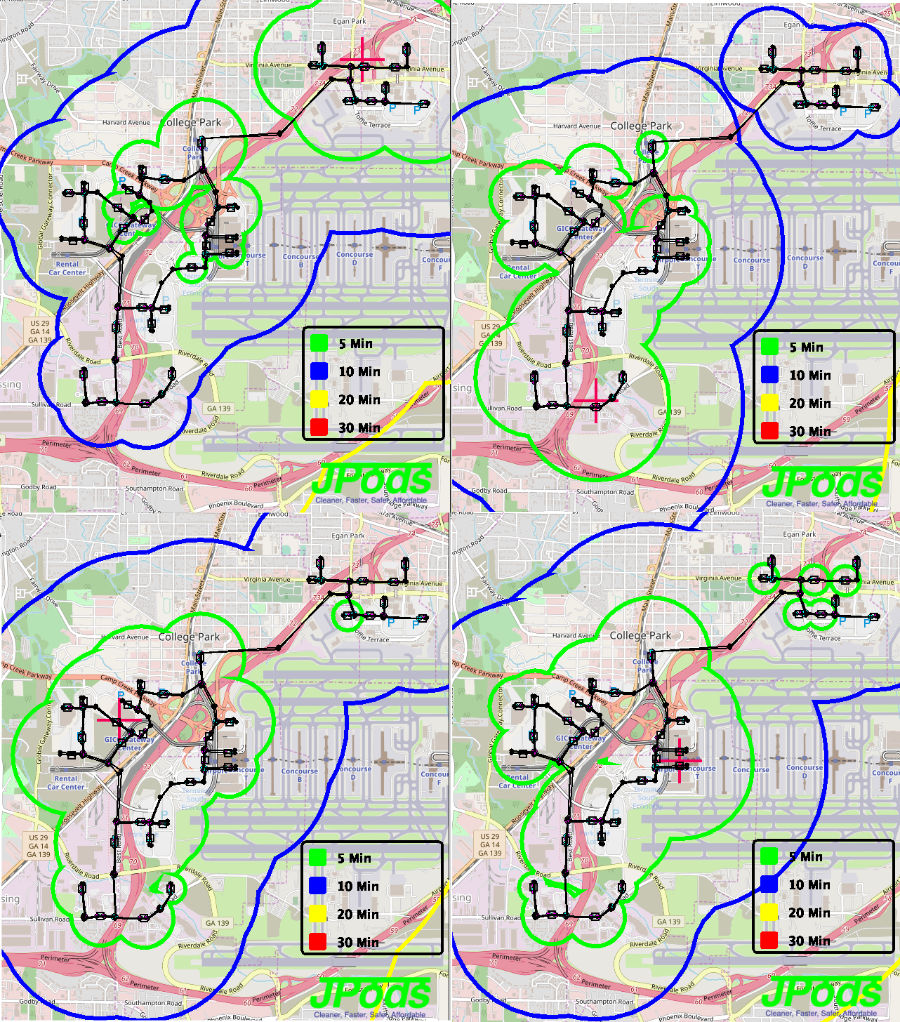
TEDx Atlanta, 2011. It has been a long process to restore liberty to innovate.
More of What is Failing will Fail
Traffic is horrible. Traffic has just gotten worse since this 1972 news story by Walter Cronkite on Tricia Nixon opening the first digital transportation network. The Morgantown PRT network has since delivered 150 million oil-free passenger-miles with only two minor injuries. Injuries on roads are 11,200 per million (link).
Who pays for Building the JPods Network
JPods LLC and the Georgia Mobility Company LLC pay to build our solar-powered mobility networks.
- We are investors, not vendors.
- We are taxpayers. We pay 5% of our gross revenues to use the public Rights of Way.
- We are investing Georgia to provide solar-powered mobility networks that combine:
- JPods Networks are 10 time to 50 times less expensive per passenger-mile that cars and buses.
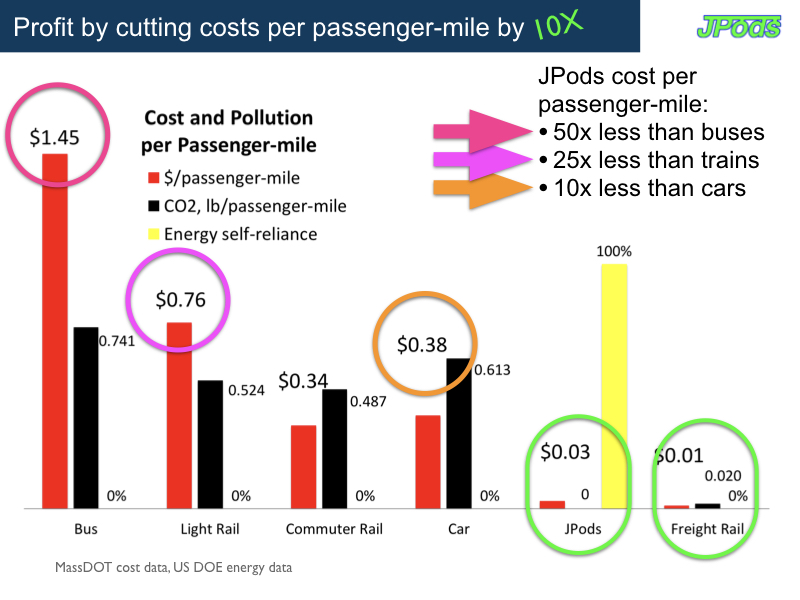
Capital Flow:
Because of a century of centrally plan infrastructure, it surprise Americans to think that infrastructure should be privately funded. But building of the Internet and Transcontinental Railroads provide case studies in why infrastructure should be privately funded.
The book Great by Choice, Uncertainty, Chaos, and Luck - Why Some Thrive Depite Them All explains the processes required:
- "20-mile marching", incremental, steady, disciplined, step by step efforts.
- "Fire bullets, then cannon balls", tinkering by starting small and iterating relentlessly.
The book Nothing Like It in the World, is a case study on how private capital funded building the railroads. The following graphic illustrates three types of capital are used by two different types of companies:
- Local Mobility Companies® (LMCs) mission is to own and operate the JPods networks to meet local needs. LMCs have two tasks:
- Gain Rights of Way access (Solar Mobility Act and/or Franchise Contract with 5X5% Performance Standard)
- Profit by serving the fare box payers with greater value than the cost to compete.
- Master Mobility Companies® (MMCs) construct the networks defined by the LMCs. MMCs operate with very focused requirements:
- Repay construction captial every 12 months by selling completed networks to LMCs to operate.
- From survey to certification of rail should take no more than 9 months once the manufacturing base is ramped to scale.
- Complete 3 to 10 miles of networks per day per crew, matching the pace the Transcontinental Railroads were built in the 1860s.
Links to key metrics:
- Capacity
- Economic Work
- Metrics
- Paybacks
- Energy
- Safety
- Faster
- Real Estate Savings
- Summary of 10X savings
- Traffic Map
Contract signed on 2018-01-17 to build the world's first solar-powered mobility network by Dec 2019.
News:
Theme by Danetsoft and Danang Probo Sayekti inspired by Maksimer